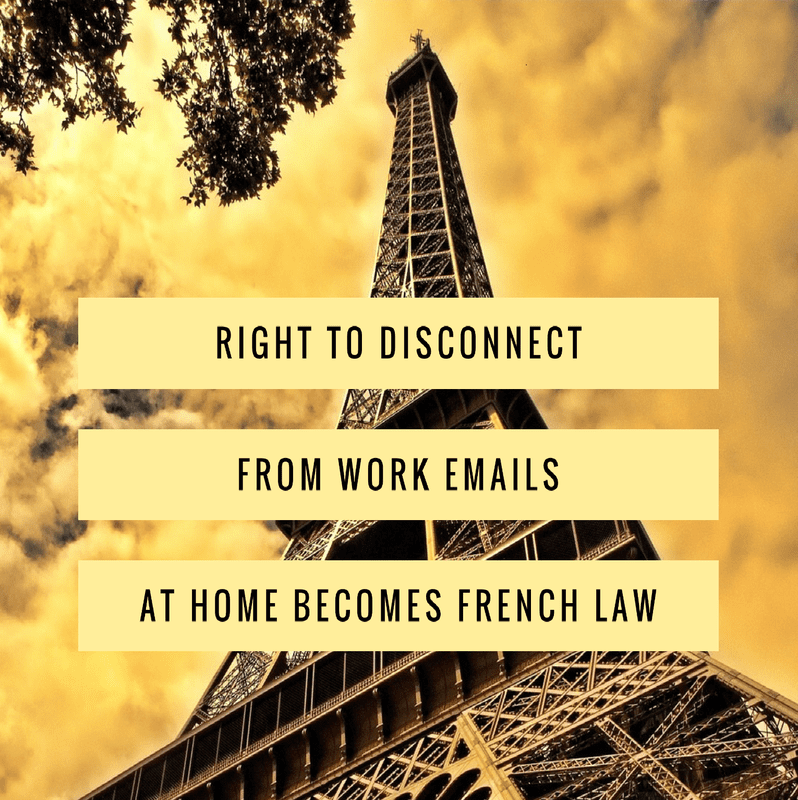In France, a new "right to disconnect" law took effect on January 1, 2017 that requires companies with over 50 employees to clearly define hours when employees are not required to check or reply to work emails. Will the US follow?
In 2016, the US Department of Labor issued a “request for information on the use of technology, including portable electronic devices, by employees away from the workplace and outside of scheduled work hours.” The request is an early step in the federal rule-making process and there's no guarantee it will translate into new laws. No matter what happens, here is today’s reality:
There are employees who feel the obligation to constantly deal with work emails at home leads to increased stress, problems sleeping and relationship troubles. In examining the impact of after-hours email and the time it adds to the workday, a recent university study supports this concern and uncovered a new problem: the growing organizational expectation that employees will respond to after-hours email.
This expectation, the study said, “creates anticipatory stress” and “influences employee’s ability to detach from work regardless of the time required for email.” Samantha A. Conroy of the University of Colorado and a co-author of the study, "Exhausted But Unable to Disconnect" explains further:
“What we find is that people who feel they have to respond to emails on their off hours become emotionally exhausted, partially because they can’t detach from work. It’s not only that employees are spending a certain amount of extra time answering emails, but it’s that they feel they have to be ready to respond and they don’t know what the request will be. So if they’re having dinner with their family, and hear that ‘ding,’ they feel they have to turn their attention away from their family and answer the email.”
So should the US follow in France's footsteps? For the time being, our vote is "no".
Managing after-hours email does not have a "one size fits all" solution. Employers in different industries have different business and customer needs...needs that can rightly influence company expectations on how employees manage after-hours work emails. One obvious example is the IT profession, which more than ever is a de facto 24/7 industry.
Speaking for our company, PhoenixHR LLC, consulting is another area which can demand extended access in today's ultra-connected world. Human Resources and Payroll are functions which often encounter unexpected crisis that do not fit neatly in an 8 hour day...so for the HR and PR services we provide our clients, our employees keeps extended hours by choice. Similarly, our firm’s resume writing service maintains extended access for its resume clients in recognition of the fact that many are actively employed and unable to discuss their resume needs during "standard" work hours. Extended access is part of our value-add proposition.
Should employers have policies for dealing with emails and work after-hours? Yes...but they should be voluntary rather than mandated by legislation. Employers should be allowed to tailor those policies to the unique needs of their businesses and customers without the burden of government regulation.
In return for this flexibility, employers can help maintain quality of life for their employees by complying with existing employment law. Obviously, hourly and non-exempt employees who work after-hours should be paid overtime in accordance with applicable law. For exempt employees who deal with after-hours emails, employers should check to ensure their exempt classification meets current overtime regulations (which have changed dramatically).
Some "low cost/no cost" ways employers can help maintain quality of life for their employees (especially exempt employees who incur "hidden hours" of work without pay to deal with after-hour emails) include:
For the time being, the key for employers to voluntarily manage the "right to disconnect" is simple: as Steve Jobs famously advised Tim Cook on how to run Apple as Jobs’ appointed successor: "Just do what's right".
We hope you found this post helpful and thank you for sharing it with your friends and associates.
In 2016, the US Department of Labor issued a “request for information on the use of technology, including portable electronic devices, by employees away from the workplace and outside of scheduled work hours.” The request is an early step in the federal rule-making process and there's no guarantee it will translate into new laws. No matter what happens, here is today’s reality:
- Technology and devices have created unprecedented communication channels and ultra-fast access to employees.
- Responses which a boss in 1997 might have waited for until next day or next week are often responses a boss in 2017 expects to get in real-time.
- As the lines between work-life and home-life continue to blur, working an office desk for 8 hours a day is no longer the "standard".
There are employees who feel the obligation to constantly deal with work emails at home leads to increased stress, problems sleeping and relationship troubles. In examining the impact of after-hours email and the time it adds to the workday, a recent university study supports this concern and uncovered a new problem: the growing organizational expectation that employees will respond to after-hours email.
This expectation, the study said, “creates anticipatory stress” and “influences employee’s ability to detach from work regardless of the time required for email.” Samantha A. Conroy of the University of Colorado and a co-author of the study, "Exhausted But Unable to Disconnect" explains further:
“What we find is that people who feel they have to respond to emails on their off hours become emotionally exhausted, partially because they can’t detach from work. It’s not only that employees are spending a certain amount of extra time answering emails, but it’s that they feel they have to be ready to respond and they don’t know what the request will be. So if they’re having dinner with their family, and hear that ‘ding,’ they feel they have to turn their attention away from their family and answer the email.”
So should the US follow in France's footsteps? For the time being, our vote is "no".
Managing after-hours email does not have a "one size fits all" solution. Employers in different industries have different business and customer needs...needs that can rightly influence company expectations on how employees manage after-hours work emails. One obvious example is the IT profession, which more than ever is a de facto 24/7 industry.
Speaking for our company, PhoenixHR LLC, consulting is another area which can demand extended access in today's ultra-connected world. Human Resources and Payroll are functions which often encounter unexpected crisis that do not fit neatly in an 8 hour day...so for the HR and PR services we provide our clients, our employees keeps extended hours by choice. Similarly, our firm’s resume writing service maintains extended access for its resume clients in recognition of the fact that many are actively employed and unable to discuss their resume needs during "standard" work hours. Extended access is part of our value-add proposition.
Should employers have policies for dealing with emails and work after-hours? Yes...but they should be voluntary rather than mandated by legislation. Employers should be allowed to tailor those policies to the unique needs of their businesses and customers without the burden of government regulation.
In return for this flexibility, employers can help maintain quality of life for their employees by complying with existing employment law. Obviously, hourly and non-exempt employees who work after-hours should be paid overtime in accordance with applicable law. For exempt employees who deal with after-hours emails, employers should check to ensure their exempt classification meets current overtime regulations (which have changed dramatically).
Some "low cost/no cost" ways employers can help maintain quality of life for their employees (especially exempt employees who incur "hidden hours" of work without pay to deal with after-hour emails) include:
- Don't take employees for granted. Say "thank you" (it’s free) every once in a while for the extra work they do.
- Be selective about holding employees to an expectation of an "instant” after-hours response. Allow employees to have a life...remember that there was a time before answering machines, computers, emails and smart phones? Even without all those advances, business didn't grind to a halt then...so it certainly won't now.
For the time being, the key for employers to voluntarily manage the "right to disconnect" is simple: as Steve Jobs famously advised Tim Cook on how to run Apple as Jobs’ appointed successor: "Just do what's right".
We hope you found this post helpful and thank you for sharing it with your friends and associates.
- Click here for link to university study.
- Click here to explore our HR services.
Click here to explore our Resume services. - Click here to like our Facebook company page.
- Click here to follow our LinkedIn company page.




